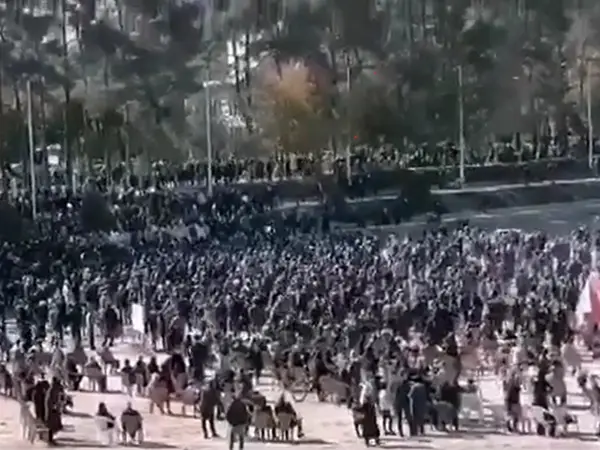Hundreds of residents of Esfahan joined farmers protesting against water shortage and the drying up of the river, Zayandeh Roud, that flows through the city.
Footage aired by state television and social-media posts showed protesters marching in the dry river bed towards the 17th-century Khajou Bridge Friday.
They chanted "Flowing Zayandeh Roud Is Our Indisputable Right," a play on the slogan "Nuclear Energy Is Our Indisputable Right," "We Support Farmers," often chanted at state-sanctioned rallies. "Give Back Our Zayandeh Roud, Give Back Isfahan Its Breath," and "There Will Be Unrest In Esfahan If the River Doesn't Flow," protesters chanted.
Drought and global warning have led to water shortages across the region in recent years, including Syria, Iraq where crop production has been halved, and Saudi Arabia, where King Salman recently asked subjects to pray for rain. In Iran as elsewhere there have been tensions between communities vying for water supply.
But the water crisis has been getting worse in Iran for the past decade because of mismanagement in constructing unnecessary dams, encouraging water-thirsty crops like rice and political influence in water distribution.
Zayandeh Roud – which starts from the Zagros Mountains, whirls through Esfahan and disappears in wetlands east of the city – has been completely dry most of the year for two decades. Esfahani farmers started a new round of protests Monday.
Protesters sleeping in tents pitched in the dry riverbed at night say water “traditionally” allocated to farmers has gone to businesses or to other provinces, and that the Esfahani farmers cannot sow autumn crops, including wheat, while their livestock is damaged.
Ali-Akbar Mehrabian, the energy minister, flew to Esfahan Friday to investigate the situation, with some protestors blaming power industries for using water.
"We have come from east and west to seek what is our right. We are neither thugs and hooligans, nor preying on other's livelihood. We are a group of hardworking farmers with calluses on our hands and bare feet. Our men and women's subsistence depends on farming, " one farmer said in a speech to protesters on Tuesday alluding to often-used accusation of being "thugs and hooligans" brought against protesters by the authorities.
There has been land subsidence in the city and at the city airport due to water scarcity, the farmer said. Photos posted to social media show cracks in the ground around the airport, and hollows and cracks in and around Esfahan’s historical buildings and monuments.
Farmers in Esfahan have held several protests this year despite a warning by Esfahan's Revolutionary Prosecutor's Office on April 24 to avoid rallies without a permit. The prosecutor warned that unlicensed protests risked "misuse" by people with "destructive goals." Khuzestan protests in July over water lasted for nearly two weeks, in which at least 12 people were killed when security forces used force.
Government critics blame the water situation an emphasis on attempts to achieve self-sufficiency in agriculture, including water-intensive crops such as rice and other grains.
Ali Salajegheh, Iran’s representative at Cop26 in Glasgow, Scotland, told the BBC Thursday, that Iran would sign the Paris accords once sanctions were lifted. "Iran has been impacted by climate change like every other place in the world," he said. "This has reduced our rainfall per annum and also the inflow of water into our rivers has reduced by 40 percent this has affected our agriculture and affected our industrial and drinking water."
Iran is the world's eighth largest CO2 emitter yet is one of the few countries not to ratify the 2015 Paris pact.
